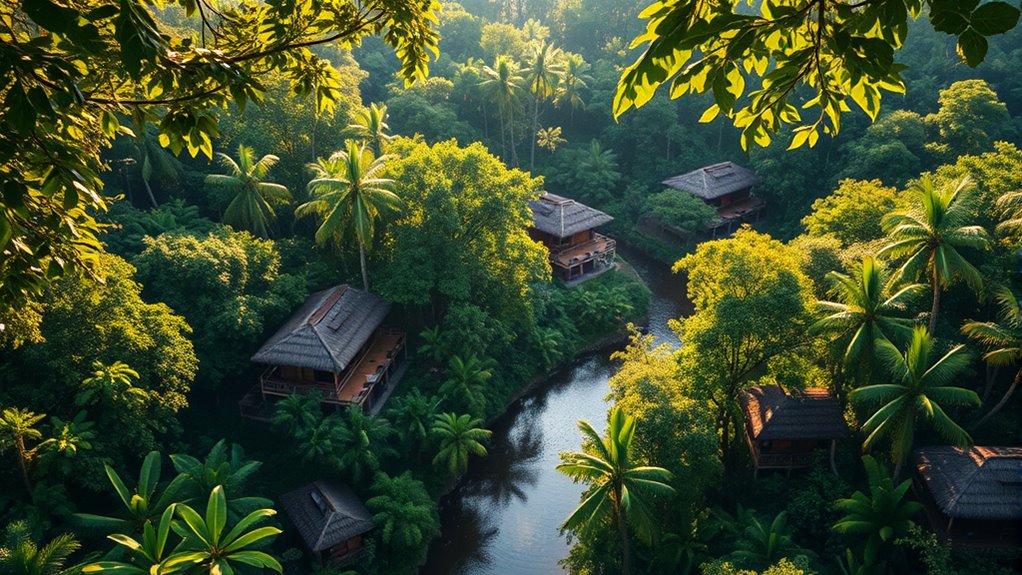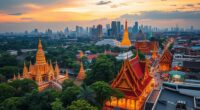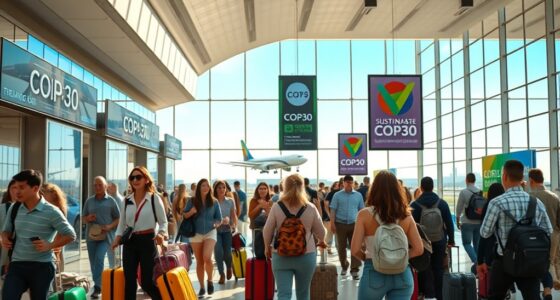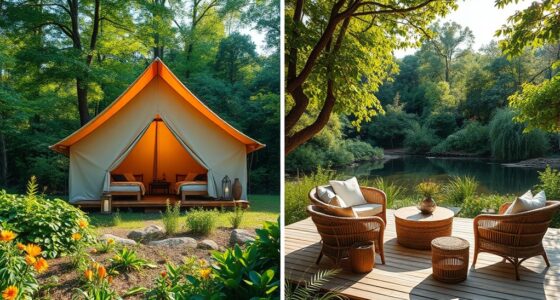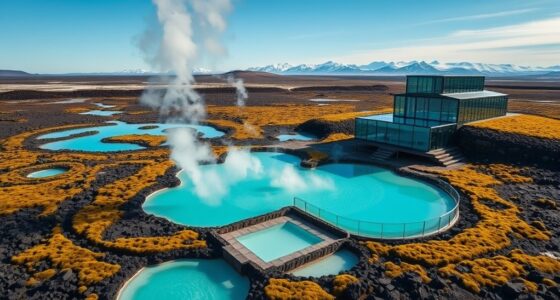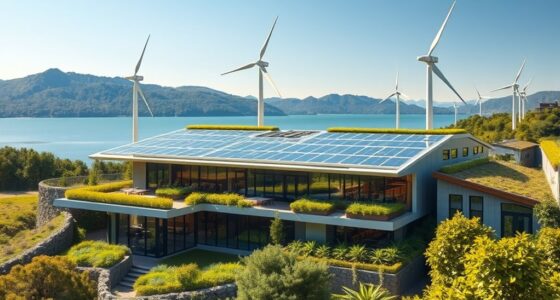When you explore rainforest lodges in the Amazon, you’re choosing sustainable travel that protects the environment and supports local communities. These eco-lodges, like Inkaterra Reserva Amazónica and Yachana Lodge, prioritize responsible practices, such as using renewable materials and carbon neutrality initiatives. You’ll enjoy luxury accommodations infused with local charm, unique activities, and cultural exchanges with indigenous communities. The Amazon offers unforgettable experiences while contributing to its preservation—there’s much more to discover about this remarkable ecosystem.
Key Takeaways
- Eco-lodges in the Amazon prioritize sustainability, blending adventure with environmentally conscious travel experiences and cultural immersion.
- Notable eco-lodges like Inkaterra Reserva Amazónica and Yachana Lodge utilize renewable resources and support local communities through employment and cultural programs.
- Carbon neutrality initiatives by lodges, such as Rainforest Expeditions, help offset emissions while funding community development and forest protection efforts.
- Guests can engage in unique activities, including nocturnal expeditions, canopy climbing, and cultural exchanges with indigenous communities, enriching their experience.
- Responsible tourism at eco-lodges fosters appreciation for the rainforest, supports conservation, and enhances local economies, promoting ecological balance in the Amazon.
Overview of Eco-Lodges in the Amazon
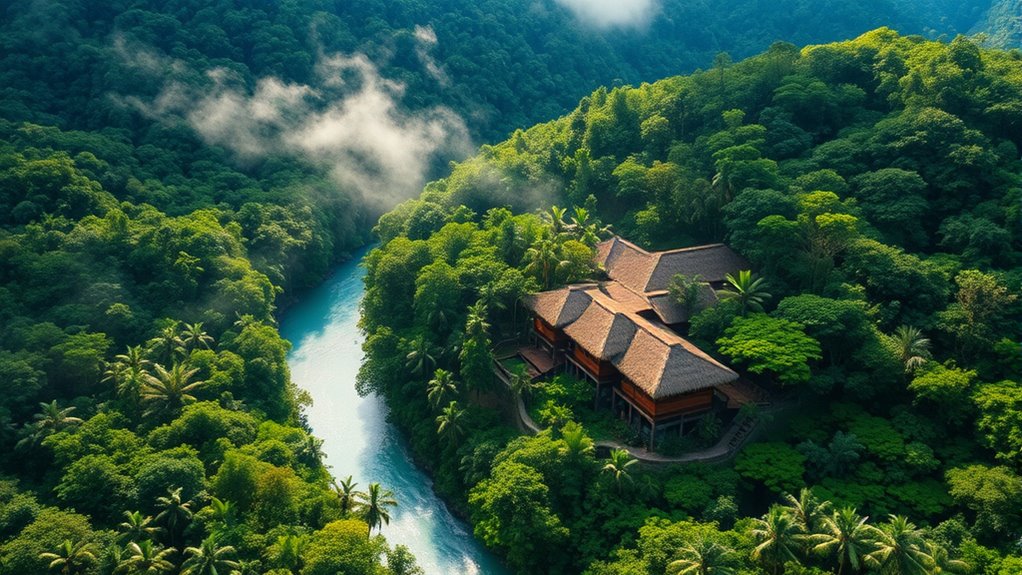
When you think about escaping to the Amazon, eco-lodges offer a perfect blend of adventure and sustainability.
These unique accommodations are scattered across stunning locations, like Inkaterra Reserva Amazónica along the Madre de Dios River in Peru and Yachana Lodge in Ecuador’s lush Amazonian region.
Discover unique eco-lodges like Inkaterra Reserva Amazónica in Peru and Yachana Lodge in Ecuador, nestled in breathtaking Amazonian landscapes.
La Selva Jungle Lodge, nestled in Yasuní Biosphere Reserve, and Chalalán Ecolodge in Bolivia’s Madidi National Park showcase innovative design and traditional architecture. Eco-lodges promote environmentally conscious travel experiences that allow you to connect with local cultures and traditions.
Tahuayo Lodge, with its screened cabins on stilts, connects you directly to nature.
Each eco-lodge not only provides a comfortable stay but also enriches your experience through cultural immersion and local community engagement.
Choose one, and you’ll dive into the rich biodiversity and culture of the Amazon while supporting sustainable tourism.
Commitment to Sustainability
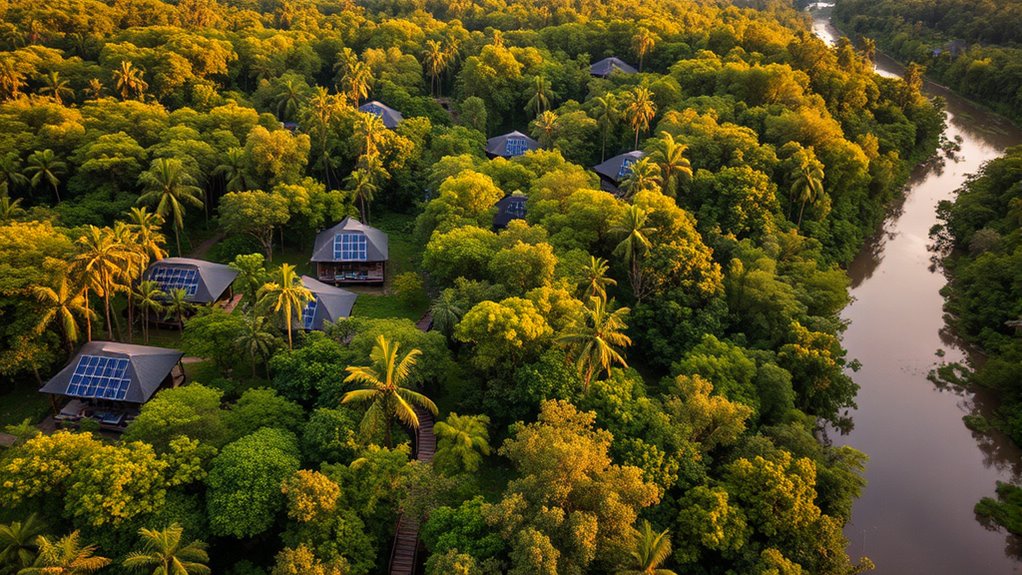
While exploring the Amazon, you’ll find that eco-lodges are deeply committed to sustainability, making them a responsible choice for your adventure.
Itamandi Lodge uses sustainable materials and low-energy technologies to minimize environmental impact, while Cristalino Lodge employs certified timber from renewable forests. You’ll see many lodges utilizing solar power and efficient water conservation systems.
They actively support local communities, offering employment and cultural immersion, ensuring that your visit enriches the lives of others.
Eco-lodges also incorporate innovative architecture, blending seamlessly with nature and promoting responsible waste management practices.
Carbon Neutrality Initiatives
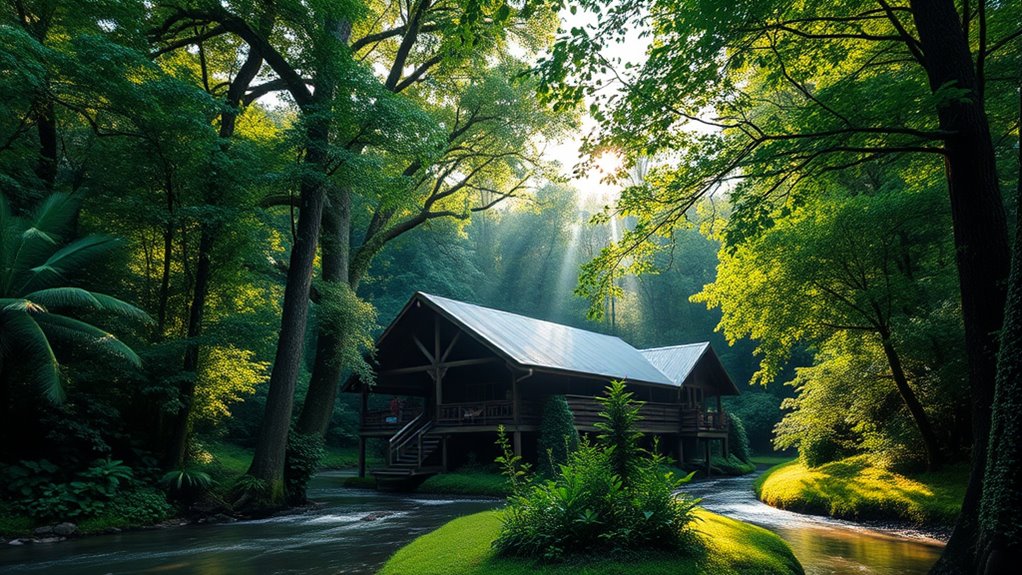
As travelers increasingly seek eco-friendly options, carbon neutrality initiatives in the Amazon rainforest are becoming essential for lodges aiming to reduce their environmental impact.
Rainforest Expeditions operates three fully carbon-neutral lodges in Tambopata, Peru, making them the first in the region to achieve this milestone. They partner with Regenera for managing carbon footprints and offsetting emissions from daily operations and staff transportation. Effective location scouting is vital for ensuring that these lodges are situated in areas that minimize ecological disruption. Moreover, the use of predictive analytics can help in identifying potential environmental impacts before they occur, allowing for proactive measures to be implemented. Additionally, utilizing renewable energy sources can further enhance the sustainability of these lodges by reducing reliance on fossil fuels. Implementing cost-cutting strategies can also aid in maintaining operational efficiency without compromising environmental goals.
Rainforest Expeditions leads the way in eco-tourism with three carbon-neutral lodges in Tambopata, Peru, partnering with Regenera for sustainable practices.
Notably, 60% of revenues from carbon offsetting support local communities dedicated to forest protection. Collaborations with Nature Services Peru further enhance these efforts by offsetting guests’ travel emissions.
These initiatives not only help maintain the rainforest’s vital carbon sink role but also engage you, the traveler, in meaningful sustainability efforts while contributing to global climate action. Investing in such eco-friendly practices can be viewed as a way to diversify investment portfolios through responsible tourism initiatives.
Eco-Friendly Accommodations and Amenities
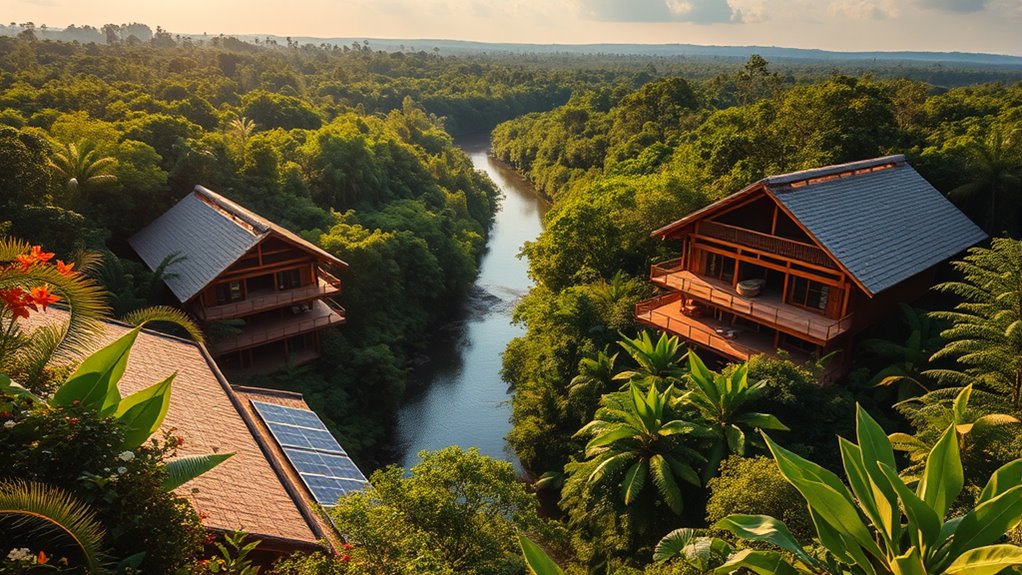
Eco-friendly accommodations in the Amazon rainforest offer a unique blend of luxury and sustainability, ensuring you can enjoy nature without compromising on comfort.
Many lodges utilize local, eco-friendly materials and draw inspiration from indigenous architecture. You’ll find spacious luxury suites that feature private balconies and rainforest showers, perfect for an immersive experience.
Relaxation areas with hammocks and swimming terraces invite you to unwind in style. The gourmet cuisine highlights local dishes and caters to various dietary needs.
Plus, the lodges prioritize community engagement by hiring local staff and supporting community projects. With renewable energy sources and efficient water management systems, you can rest easy knowing your stay is both luxurious and environmentally responsible.
Immersive Rainforest Experiences
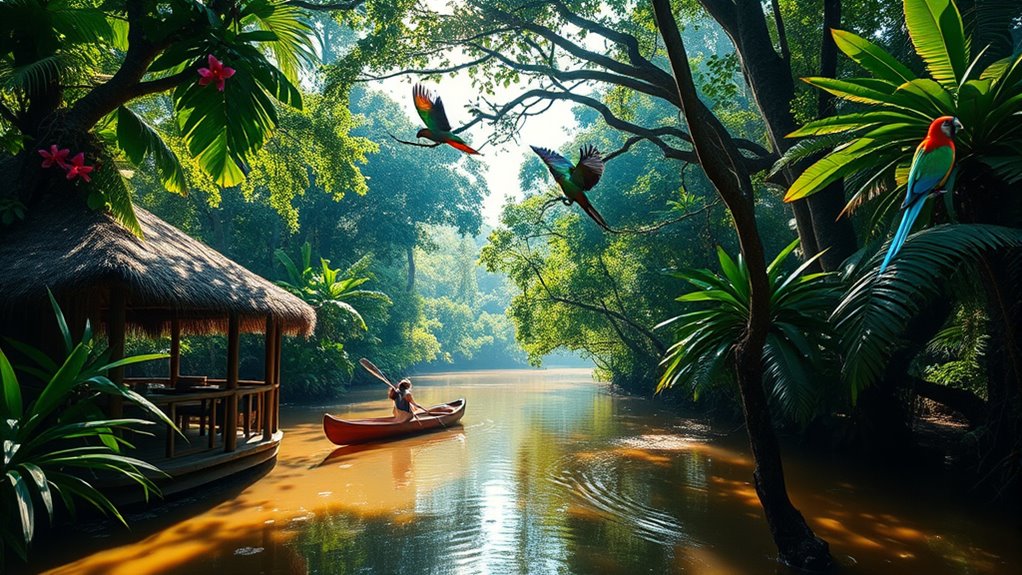
When you venture into the Amazon rainforest, you’re not just observing nature—you’re diving into an unforgettable world filled with rich wildlife and vibrant cultures.
Imagine walking along canopy walkways, where breathtaking views reveal unique bird species and playful monkeys. Guided wildlife watching tours let you spot jaguars, sloths, and even the elusive pink river dolphins.
Birding here is unparalleled, with toucans and macaws adding splashes of color to your adventure. You might interact with curious howler or capuchin monkeys, making for memorable encounters.
As you explore serene waterways by canoe or kayak, you’ll appreciate the tranquility and beauty surrounding you. Every moment immerses you deeper into the magic of the Amazon, creating lasting memories of this incredible ecosystem.
Supporting Local Communities
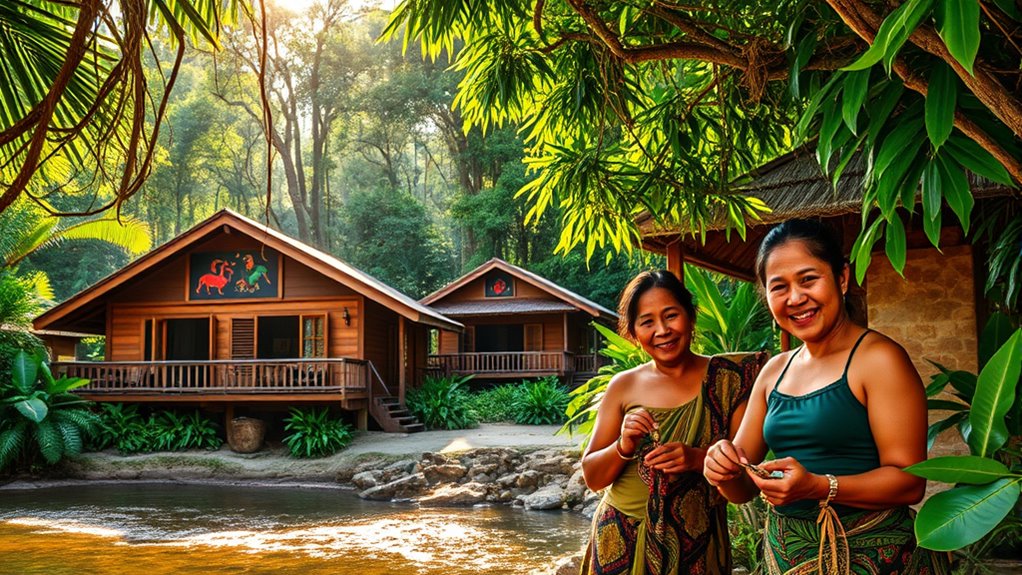
Exploring the Amazon rainforest offers more than just breathtaking sights; it also provides an opportunity to support local communities.
When you choose to stay at eco-lodges, you directly contribute to local employment, giving residents financial stability and reducing the need for unsustainable practices. Many lodges partner with indigenous groups, ensuring their cultural traditions are respected.
By using local materials and services, these lodges inject money into the community, enhancing economic resilience. They also provide educational support, from school materials to workshops on sustainability.
This focus on community engagement not only empowers local entrepreneurs but also preserves cultural heritage, creating a positive, lasting impact on the Amazon and its people.
Your visit can truly make a difference.
Responsible Tourism Practices
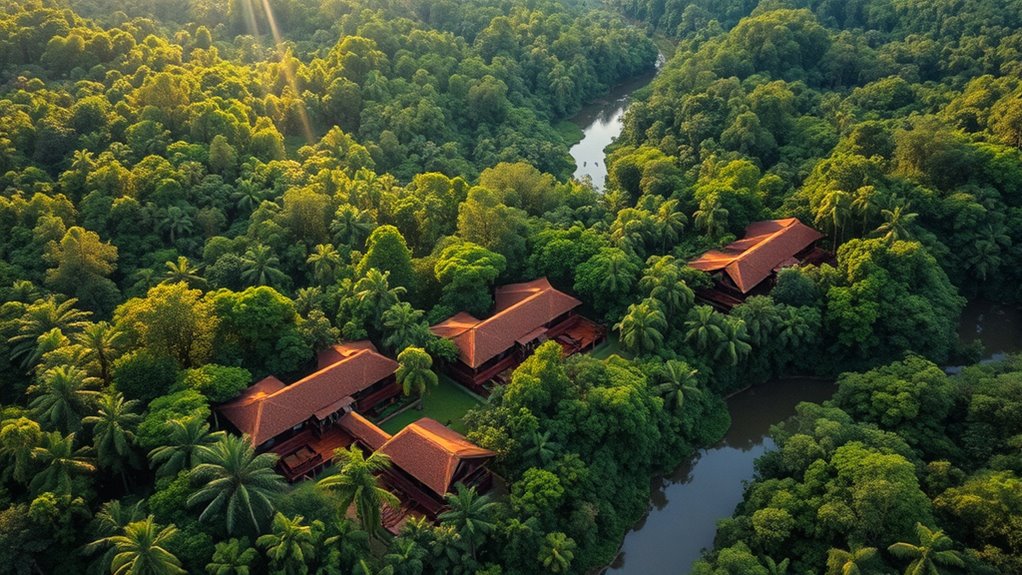
Responsible tourism practices are essential for preserving the Amazon rainforest’s unique ecosystem while allowing you to enjoy its beauty. By choosing operators like Kuoda, who prioritize sustainability and transparency, you ensure your trip supports eco-friendly practices.
Always minimize waste by using reusable containers and avoiding single-use plastics, as the Amazon’s delicate environment can’t handle excess pollution. Respect wildlife by observing from a distance and staying on designated trails to protect habitats.
Additionally, look for eco-lodges that use local materials and promote energy efficiency. Your conscious decisions help maintain ecological balance, support local economies, and raise awareness about the importance of conservation.
Embrace responsible tourism to ensure the Amazon thrives for generations to come.
Eco-Tourism Activities for Guests
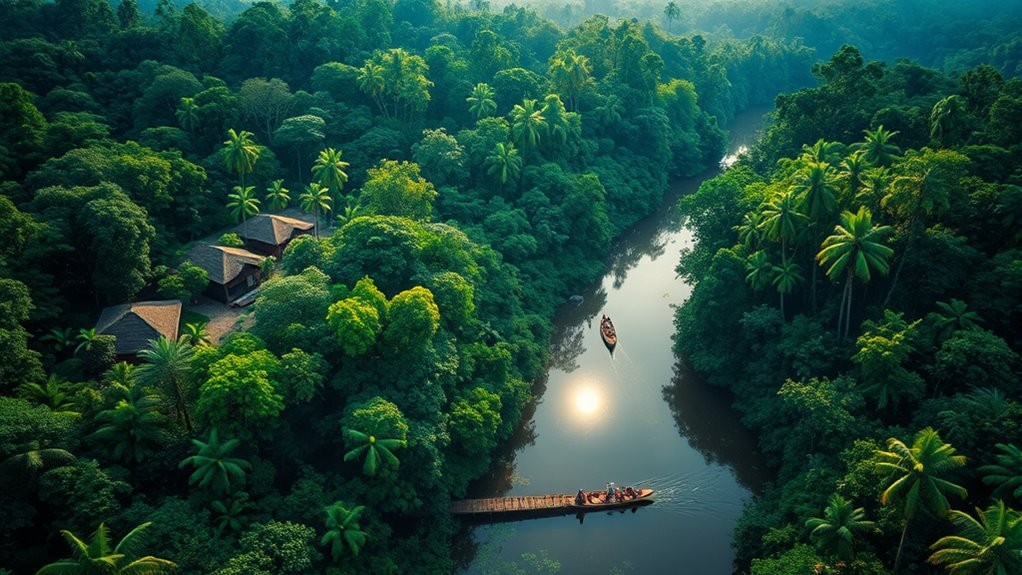
Eco-tourism activities in the Amazon rainforest offer you a chance to immerse yourself in its rich biodiversity while supporting conservation.
You can embark on nocturnal expeditions to spot alligators and night monkeys, or try canopy climbing for a unique perspective of the treetops.
Survival training at lodges like Tahuayo teaches skills used by indigenous tribes, while educational jungle walks reveal medicinal plants and unique tree species.
Water activities like kayaking and canoeing let you explore the intricate waterways, where you might even fish for piranhas.
Don’t miss the stargazing opportunities under the Amazon’s clear skies.
Each activity not only enhances your experience but also contributes to the preservation of this breathtaking ecosystem.
Cultural Exchange Opportunities
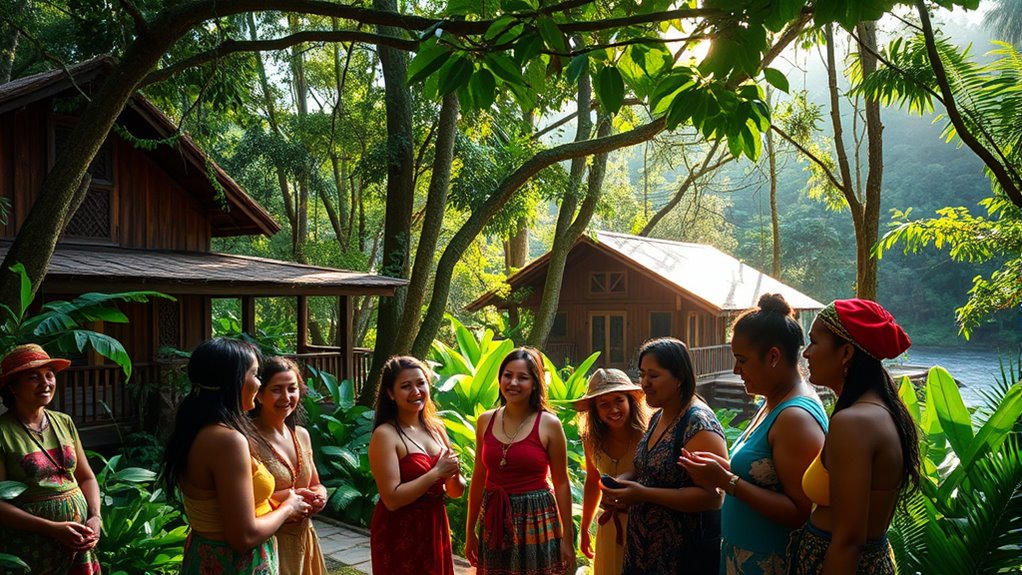
Engaging with the Amazon rainforest goes beyond its stunning landscapes and thrilling activities; it opens doors to rich cultural exchange opportunities that deepen your understanding of the region.
Many lodges invite you to connect with local indigenous communities, allowing you to participate in traditional ceremonies like the Guayusa ceremony. You’ll learn to create handicrafts from jungle materials and hear captivating stories about the history and traditions of the people, similar to the way the Hopi Tribe preserves ancestral knowledge.
These experiences not only enrich your journey but also support community development and sustainable practices. By engaging in educational initiatives, you’ll gain insights into medicinal plants and the importance of preserving biodiversity, ensuring your visit leaves a positive impact on both the culture and the environment. Additionally, such cultural exchanges can mirror the spiritual connection to land that is integral to many indigenous communities.
The Importance of Preserving the Amazon Rainforest
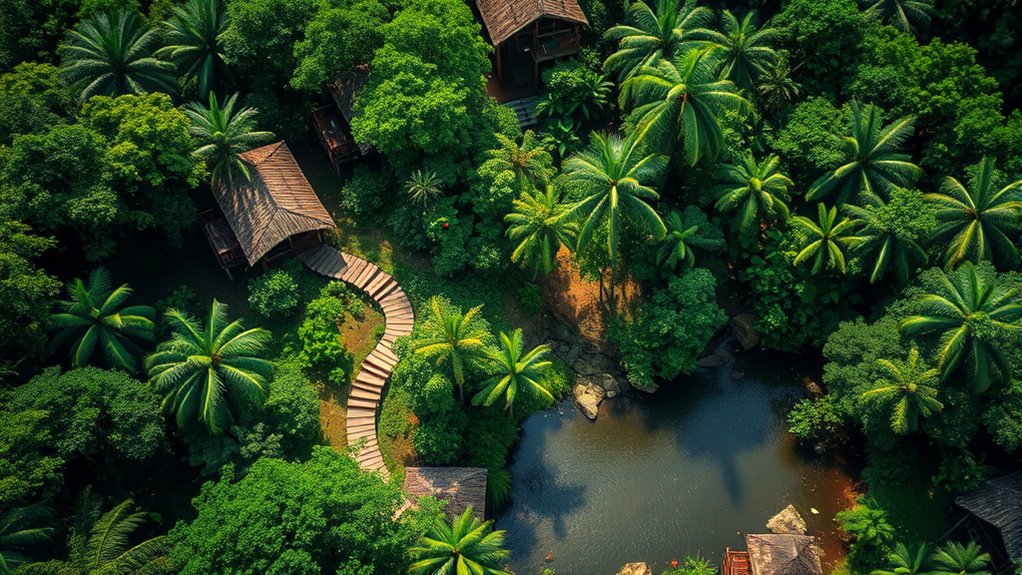
As the lungs of our planet, the Amazon rainforest plays a vital role in maintaining ecological balance and supporting life. Home to at least 10% of all known species, it’s an unparalleled ecosystem vital for biodiversity. Endangered species like jaguars and river dolphins depend on this habitat for survival.
Moreover, the Amazon stores 150-200 billion tons of carbon, stabilizing our climate and regulating global water cycles. Its trees create “flying rivers,” ensuring water supply across regions.
However, deforestation threatens these crucial functions, potentially leading to irreversible species loss and climate disruption. By preserving the Amazon, you help protect our natural heritage, support indigenous communities, and ensure future medicinal discoveries.
Your actions today can make a difference for tomorrow.
Frequently Asked Questions
What Is the Best Time of Year to Visit Amazon Lodges?
The best time to visit Amazon lodges depends on what you want to experience.
If you prefer canoeing and lush landscapes, the wet season from December to May is ideal.
However, if you’d rather hike and explore the jungle paths, the dry season from June to November is your best bet.
Both seasons offer unique wildlife viewing opportunities, so choose based on your preferred activities and comfort with weather conditions.
Enjoy your adventure!
Are Children Allowed at These Eco-Lodges?
Yes, children are absolutely welcome at these eco-lodges!
You’ll find family-oriented accommodations designed for comfort and convenience. Kids can explore nature through engaging programs like Junior Naturalist Guides or the Wired Amazon Program.
They’ll enjoy jungle walks, canoe rides, and hands-on conservation projects. With special pricing for younger guests and spacious family suites, it’s an ideal spot for creating lasting memories together while fostering a love for nature.
What Payment Methods Are Accepted at the Lodges?
When booking your stay at the lodges, you’ll find several payment options available. Most accept PayPal, VISA, and Mastercard for reservations.
Some even embrace cryptocurrencies like Bitcoin and Ethereum. You can also use Apple Pay or Google Pay through Stripe.
Depending on the lodge, you might be able to pay in various currencies. Remember that full payment is often necessary for special offers and non-refundable bookings, so plan accordingly!
Is Internet Access Available in the Rainforest Lodges?
Yes, internet access is available at some rainforest lodges, but it varies significantly.
You’ll find high-speed options at places like Otorongo Expeditions, while others, like Explorama Lodges, offer WiFi in public areas.
However, some lodges prioritize a disconnect from technology, encouraging you to immerse yourself in nature instead.
If you’re a digital nomad, look for lodges that cater to remote work with comfortable workspaces and guided excursions.
What Health Precautions Should I Take Before Visiting the Amazon?
Before you visit the Amazon, think about a traveler who contracted malaria because they didn’t take precautions.
You should ensure your vaccinations are up-to-date and schedule a health assessment to discuss specific risks.
Pack high-DEET insect repellent and wear protective clothing to avoid bites.
Bring a sufficient supply of prescription medications and consider travel insurance that covers medical emergencies.
Lastly, always drink bottled or purified water to prevent illness.
Conclusion
By choosing eco-lodges in the Amazon, you’re not just enjoying a unique getaway; you’re also supporting vital conservation efforts. Did you know that the Amazon rainforest produces 20% of the world’s oxygen? Staying at these lodges allows you to experience its breathtaking beauty while helping to preserve this precious resource. So, pack your bags and embark on an adventure that benefits both you and the planet, ensuring that future generations can enjoy the wonders of the Amazon.
